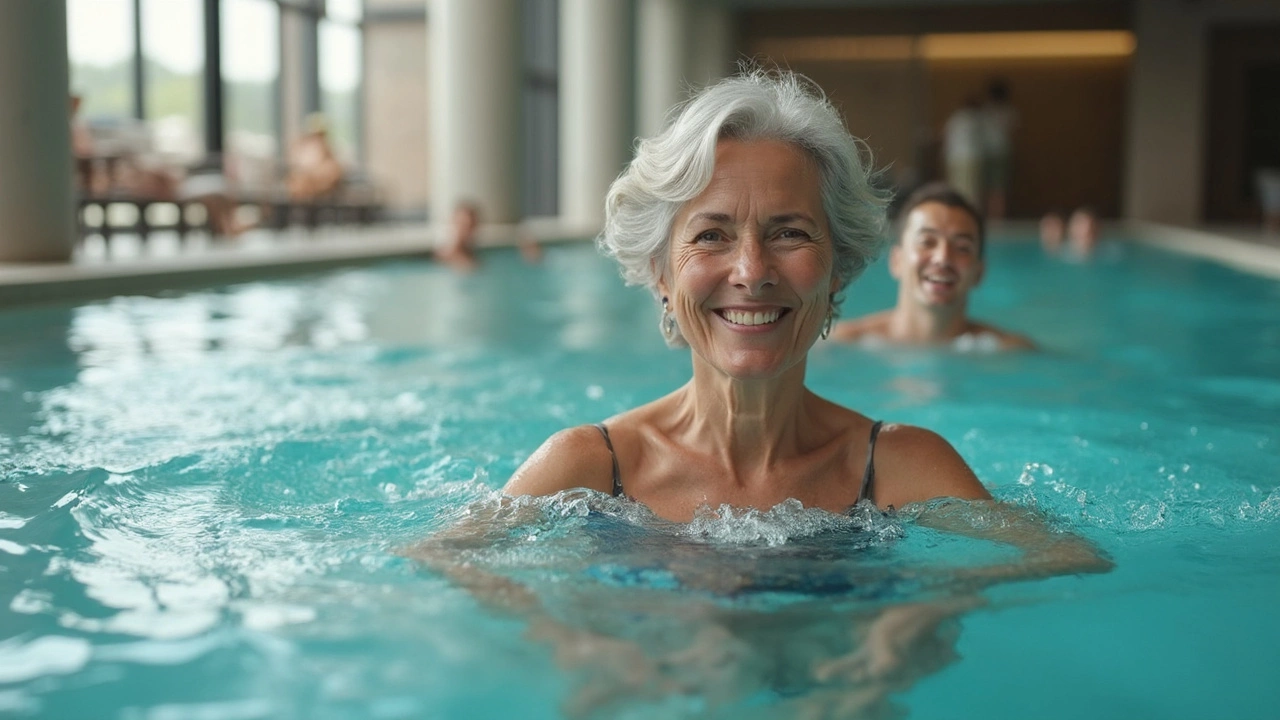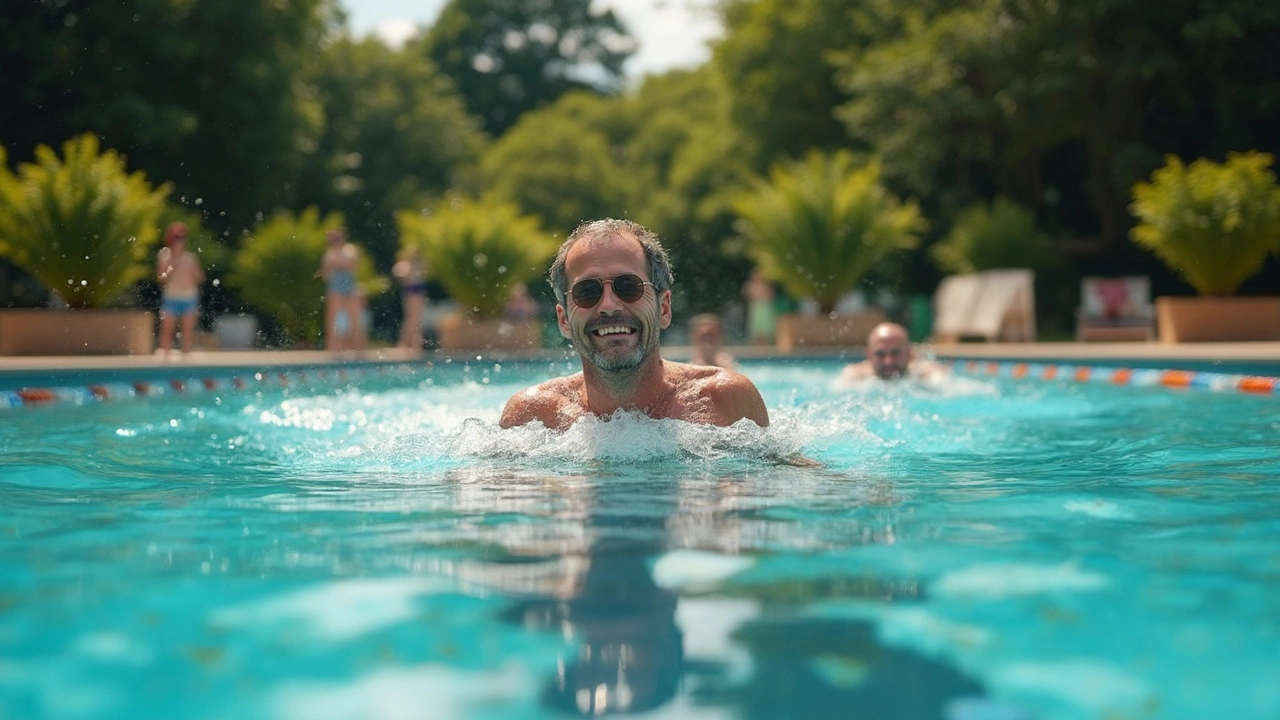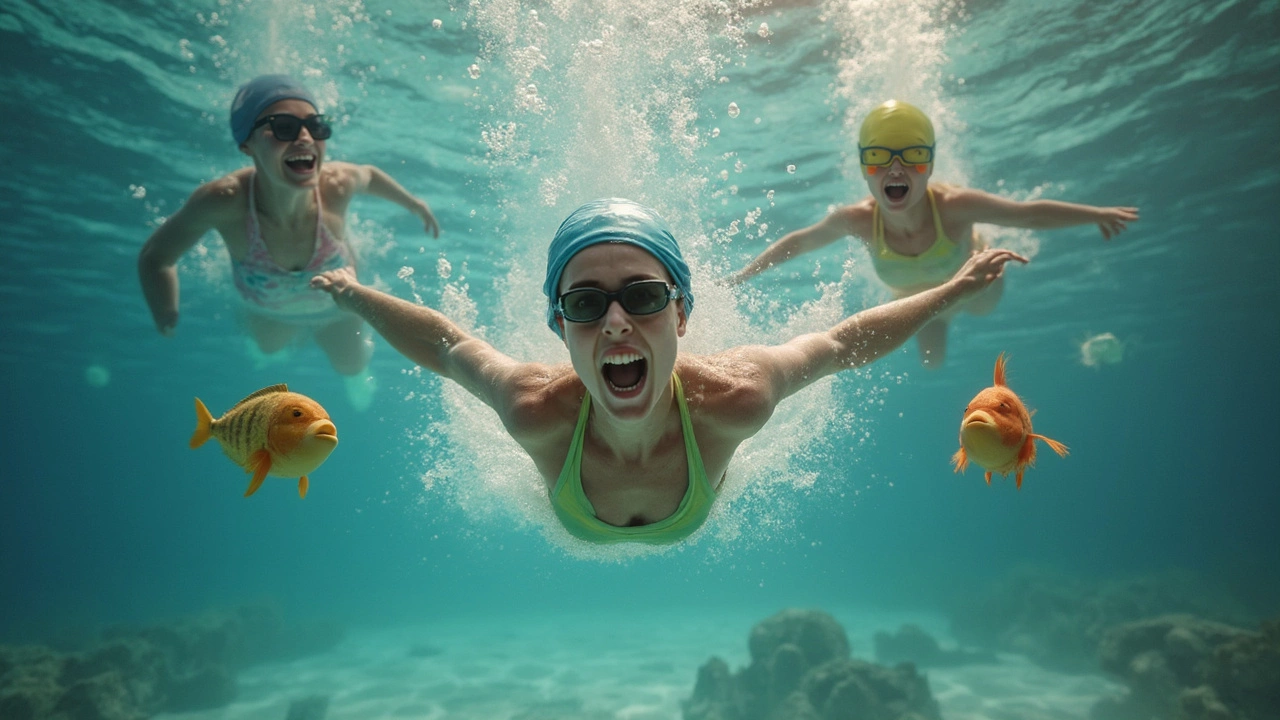Can I Learn Swimming at 50? Dive into the Benefits and Tips!

So, you're 50 and wondering if it's too late to learn swimming? Spoiler alert: it’s not! In fact, taking the plunge now can do wonders for your body and mind. Swimming is a skill that knows no age, and it’s a great low-impact exercise that works for everyone.
First off, it’s important to shake off any myths that this activity is just for kids or young adults. Many people in their 50s, 60s, and even 70s are diving into lessons—and loving it. Swimming helps build strength, increases flexibility, and boosts cardiovascular health. Plus, there’s something incredibly freeing about gliding through water.
Feeling nervous? That’s totally normal, but here's a comforting fact: You’re not alone. Lots of adults face similar jitters, but the right instructor can make all the difference. Finding a supportive class, possibly with peers in the same age group, can ease the nerves and make the experience a fun and social one.
- Why Swimming at 50 is a Great Idea
- Health Benefits of Swimming for Adults
- Common Myths and Misconceptions
- Tips for Getting Started
- Staying Motivated and Consistent
Why Swimming at 50 is a Great Idea
Thinking about taking up a new hobby? Swimming can be an excellent choice, especially at 50. This activity is more than a fun way to splash around; it packs a punch of health benefits that are hard to beat.
Low Impact, High Benefits
One of the biggest perks of swimming is its gentle nature on the body. The buoyancy of the water supports your weight, taking pressure off your joints. This makes it a perfect exercise if you’re dealing with arthritis or other joint issues often seen at this age. Despite its gentle nature, swimming increases your heart rate, helping you stay fit.
A Full-Body Workout
Swimming engages multiple muscle groups, providing a full-body workout. Whether you're working on your breaststroke or trying the butterfly, each lap strengthens different muscles. It's not just your arms and legs doing the work—your core is constantly engaged too, helping improve your overall body tone.
Boosts Mental Health
We often underestimate the mental benefits of exercises like swimming. The rhythmic nature of swimming can be meditative. It reduces stress, improves mood, and has been linked to better sleep patterns.
Dr. Jane McBride, an exercise psychologist, says, “Swimming is not only an effective way to maintain physical health as we age, but it also serves as a crucial way to maintain mental well-being.”
Friendship and Community
Joining a group class can introduce you to a community of like-minded adults enjoying the water. It’s a chance to make new friends while also staying active. Plus, there’s motivation in numbers—having a group cheering you on can be just what you need to stick with it.
Swimming Stats at a Glance
| Benefit | Impact |
|---|---|
| Burned Calories | 400 to 700 calories/hour |
| Strengthens Heart | 50% reduced risk of cardiovascular diseases |
| Mental Health | Decrease anxiety and depression symptoms |
So why wait? Grab that swimsuit, find a local class, and dive into the world of swimming. It might just become your favorite new way to stay fit, both physically and mentally!
Health Benefits of Swimming for Adults
Diving into the world of swimming as an adult opens up a sea of health perks that go well beyond the simple joy of splashing around. Whether you're 50 or older, the benefits of swimming are as numerous as the waves in the ocean!
Low-Impact Cardio
Swimming is an excellent cardiovascular workout that's gentle on the joints. Unlike running or certain gym exercises, the buoyancy of water reduces stress on your body, minimizing the risk of injury while still getting your heart rate going. It's perfect for those with arthritis or joint pain but who still crave an effective workout.
Full-Body Workout
When you swim, you're using muscles you didn't even know you had! From your arms to your core to your legs, every stroke helps to tone and strengthen your body. Because of this, learning to swim can be more beneficial than just the typical gym session.
Mental Benefits
There's something about being in water that promotes relaxation. Swimming reduces stress, improves mood, and can even lead to better sleep. The rhythmic nature of the strokes combined with the soothing water can work wonders for your mental health.
Boosts Flexibility
Each stroke involves stretching, twisting, and reaching, which enhances your flexibility over time. This is especially crucial as we age because maintaining flexibility can help with overall mobility and reduce the chance of injuries.
Community and Social Life
Swimming classes or local pools are great places to meet people. Many adults find new friends with similar interests when they learn swimming. This social aspect can lead to consistent attendance and increased motivation.
| Health Benefits | Impact |
|---|---|
| Cardiovascular Health | Improved circulation, heart strength |
| Muscle Strength | Full-body workout, tones muscles |
| Flexibility | Enhances mobility, reduces injury risk |
| Mental Health | Reduces stress, improves mood and sleep |
In a nutshell, swimming at 50 isn't just possible—it's downright beneficial! So grab your goggles and cap, and dive into a lifestyle that promises health and happiness.

Common Myths and Misconceptions
When it comes to learning swimming at 50, there are plenty of myths floating around that might hold you back. Let’s bust some of them here.
Myth 1: It's Too Late to Start
The truth is, it’s never too late to learn swimming. Many adults think they’re past their prime for picking up new skills, but this simply isn't true. Plenty of adults take swimming lessons each year and find success. Plus, swimming is a lifelong skill you can enjoy at any age.
Myth 2: Swimming Is Only for the Young
Sure, you might see a lot of youngsters splashing around, but swimming is for everyone. In fact, adults often find a sense of freedom in the water that they don’t experience elsewhere. You’re never too old to enjoy the sensation of floating or mastering a new swim stroke.
Myth 3: You Need to Be Fit First
You don’t have to be an athlete to begin learning to swim. Swimming itself is an excellent way to improve fitness. It’s gentle on the joints and can be tailored to your individual pace. This makes it a perfect form of exercise for beginners or those getting back into shape.
Myth 4: Instructors Won’t Understand Adult Needs
Many swim instructors are specifically trained to teach adults. They get that you might have some fears or self-consciousness and they know how to help you work through that. Adult swimming classes are tailored to ensure a comfortable and supportive learning environment.
Myth 5: Older Adults Don't Benefit from Swimming
On the contrary, the health benefits of swimming for adults are significant. From reducing stress and improving flexibility to boosting cardiovascular health, swimming can greatly enhance your overall well-being.
Busting these myths is the first step to diving into swimming with confidence and eagerness. If you're on the fence, give it a shot—you might be surprised at how much you enjoy it!
Tips for Getting Started
Ready to dive into the pool? Here are some straightforward tips that’ll make your journey to learn swimming at 50 smooth and enjoyable.
Find the Right Class
Look for lessons that cater to adults. Some pools even offer classes specifically for people over 50. This way, you won't feel out of place among kids. Check if the instructors are experienced in teaching beginner adults.
Gear Up
You don't need fancy equipment, but having the right gear can make a difference. Invest in a well-fitting swimsuit, a good pair of goggles, and perhaps a swim cap if you have longer hair. Being comfortable in the water starts with feeling good in your gear.
Start Slow
Don’t pressure yourself to swim laps from the get-go. Begin with getting comfortable in the water. Practice breathing techniques and simple floats before moving on to strokes. It’s okay to take small steps; the key is consistency.
- Practice breathing exercises to get used to the sensation of water.
- Try floating on your back to build confidence.
- Gradually introduce simple strokes like the paddle and doggy paddle.
Stay Consistent
Schedule your swim lessons regularly—ideally, two to three times a week. It doesn’t just keep your progress steady but also helps reinforce the techniques you learn.
Get a Swim Buddy
If possible, find a friend to join you. Having a swim buddy can make the experience more enjoyable. Plus, a bit of friendly competition never hurts!
Patience is Key
Remember, learning swimming is a journey, not a race. Celebrate small victories and don't be too hard on yourself. You’re doing amazing things by deciding to take this on!

Staying Motivated and Consistent
Taking the first plunge into swimming lessons can be exhilarating, but sticking with it is key. Staying motivated when learning something new, especially swimming at 50, is crucial. Here are some tips to keep you coming back to the pool.
Set Realistic Goals
Setting goals is a great way to keep your eyes on the prize. Start with small, achievable targets—maybe it's swimming one lap without a break. Once you smash that, increase your goals gradually. Keep track of your progress to see how far you've come.
Find a Community
Everything is more fun with company! Finding a swimming buddy or joining a local group can make the whole experience more enjoyable. You'll find that a bit of friendly competition and support from peers can work wonders for your motivation.
Mix Up Your Routine
Repeating the same routine can get dull quickly. Spice things up by trying different strokes or incorporating games. Not only will this keep things fresh, but it will also improve your overall swimming skills.
"Consistency is key to mastery. Make it a habit." - John P. Cardillo, a renowned swimming coach.
Track Your Progress
Seeing how you've improved over time is a massive confidence booster. Keep a simple swimming journal—note how long you swam for, how you felt, any new skills you tried. This not only helps you reflect but also inspires you to keep going.
Reward Yourself
Don't forget to celebrate your wins! Whether it’s treating yourself to a nice meal or buying new gear, rewards can be powerful motivators.
| Mile Marker | Estimated Time |
|---|---|
| First 25m Lap | 2 Weeks |
| 100m Continuous Swim | 1 Month |
| Mastering a New Stroke | 3 Months |
Remember, the trick to staying consistent is to make swimming a regular part of your week. Put it on your calendar like you would a coffee date with a friend. Before you know it, hitting the pool will feel like a natural part of your life.




